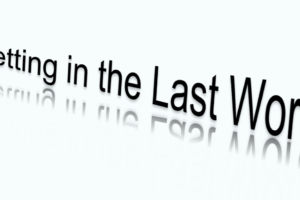Comments from Kathryn, the author of this blog and a licensed clinical social worker. The following is a brief excerpt from my latest book, How to Tame Your Inner Squirrel: 8 Strategies for Managing Your Distractions. As a licensed clinical social worker (LCSW), I wrote this book because I saw many clients in my therapy practice struggle with guilt and shame because they were easily distracted. They saw distractions as a weakness or a deficiency. It isn’t true.
The word distraction sounds so innocent. It may not even seem important, but it is. It isn’t just who is affected by an inner squirrel, it is also how you are affected. For people who have a fully-developed inner squirrel, there can be multiple distractions per day.
Research by Gloria Mark, Ph.D. in The Cost of Interrupted Work reports the cost of distractions matters very much (The Cost of Interrupted Work: More speed and stress, Gloria Mark, Daniella Gudith, Ulrich Klocke, no date). Her research indicates:
- At least two hours of productivity are lost every day as a result of distractions.
- The average amount of time spent on a task before being distracted is 11 minutes.
- It takes an average of 23 minutes and 15 seconds after a distraction to fully return to the original task.
- Every time you are distracted and have to transition from Task A to Task B, focus, energy and time are lost.
Different parts of your brain are activated every time you switch between tasks–even tasks as simple as answering a co-worker’s question while working.
Emotional Costs of Distractions
Being easily distracted can cause emotional stress, job strain, annoyance and frustration. This not only affects the person who is distracted, but it can also impact the people around you. When you are stressed or frustrated, it’s not something you keep entirely to yourself, either! You could drag your family or team down.
Example: Madison is easily distracted. At work, her usual task is to fold clothing and restock shelves after people have tried on clothing in the waiting room. She is bored and gets easily distracted. She ends up spending more time talking and distracting her co-workers than she does folding. She and her co-workers end up with verbal warnings!
Errors
With each distraction, the likelihood of making errors increases. There are three critical points when errors are most likely to occur: at the moment of the distraction, at the point of the transition from task A to task B and during the transition back from task B to task A. For someone with an inner squirrel, these transitions are prone to errors.
Example: Elijah is a sandwich artist. It is a great job for someone who has an inner squirrel because every sandwich is different. It was only a great job for Elijah until he was asked to train a new employee! He was unable to maintain focus on his customer and help the new employee, too. Elijah made multiple errors, and the customers were angry.
Productivity
If you are someone with an inner squirrel, you have probably said, “It seems like I can’t ever get anything done!” Productivity is about accomplishing tasks in a timely manner. With an inner squirrel, your distractions may prevent you from staying focused long enough to complete a task. This may even ripple to affect the productivity of those around you.
Example: Logan works for a cellphone company taking calls from customers who have a question about their bill or their cellphone service. There is a written expectation that Logan will successfully complete twelve calls per hour. Because Logan gets distracted with talking about everything except what the customer called about, he rarely meets goal.
Quality
If you are someone who is always distracted and shifting your attention from one task to another, you may end up spending more time on refocusing and less time on making sure of the quality of your project or task. It may be difficult to have quality assurance, productivity and refocusing from a distraction all at once.
Example: Ella works at the bakery of the local grocery store. Her job is frosting cakes and writing on birthday and anniversary cakes. Because Ella is easily distracted by activity around her, she frequently loses focus on what people want written on their cakes. The last time she was distracted, she wrote “Hapy Birthday Sarh”!
Time
When a distraction occurs, precious time is wasted. Time you will never get back! When distractions occur multiple times per day, wasted time and lost productivity can add up. For someone who is easily distracted, the time lost could add up to several hours in a day or multiple days during a week.
Example: Jayden is a college student. He spends at least four hours a day studying, but can’t seem to raise his grades above a C. Jayden doesn’t take into account how much time is wasted during that four-hour period: getting a snack, going to the bathroom, checking his phone and/or listening to the conversations of those around him.
There is always a cost to distractions. You may not be aware of the distractions and what they are doing to you, but they are always there. Learning how to tame your inner squirrel can lead to significant benefits:
- feeling better about yourself
- fewer errors
- higher productivity
- improved quality of work and
- more time to do the things you want to do
Learning to refocus quickly and efficiently can help keep your inner squirrel in check.
Take Away Point
Just as you can work out and train your body to be more physically fit, you can train your mind to be less distracted. With eight strategies and 200 tips, How to Tame Your Inner Squirrel: 8 Strategies for Managing Your Distractions may be able to help you!
Understanding the cost of distractions and how they impact your thought process will allow you to recognize and then control your inner squirrel.
With warmest regards,
Thank you so much for reading this blog. If you enjoyed the content, please check out other blogs at:
RelationshipsRelearned.com
RVingNomads.com
In addition to blogs and articles, I have written a series of self-help books called The Personal Empowerment Series and a fictional series named The Charlotte Novella Series. To view the books and novellas I have written, please go to my Amazon Authors Page.
To be notified of future posts, please enter your email address and click on the Subscribe button.
If you live in the State of Maine or Texas and seeking individual therapy, please go to my Concierge Therapy website: KathrynMaietta.com












